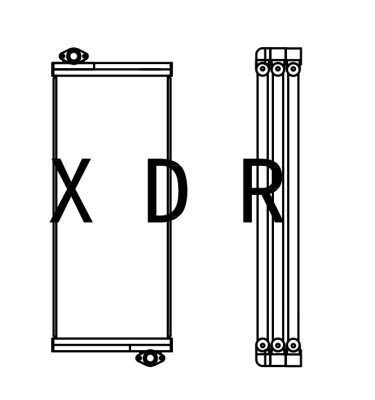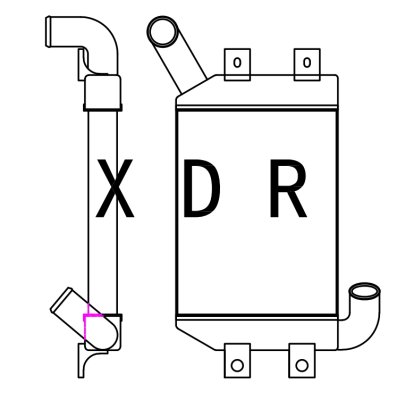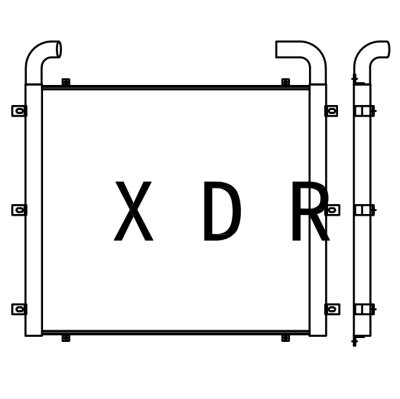What problems will occur if the excavator radiator fails?
Issues Arising from Heavy Excavator Radiator Failures
Heavy excavators are designed to operate in demanding and often harsh environments, making their cooling systems, particularly the radiator, a critical component for maintaining optimal performance. When the radiator fails, it can lead to a range of serious issues that affect the machine's efficiency, safety, and longevity. Here's a detailed look at the problems that can arise from heavy excavator radiator failures:
1. Engine Overheating
Symptoms: The engine temperature rises significantly, and the temperature warning light on the dashboard illuminates.
Consequences: Prolonged overheating can cause severe damage to internal engine components such as pistons, cylinder walls, valves, and gaskets. In extreme cases, the engine may seize, leading to a complete failure and requiring costly repairs or replacement.
2. Hydraulic System Overheating
Symptoms: The hydraulic oil temperature exceeds the normal operating range, leading to decreased system performance.
Consequences: High temperatures can accelerate the degradation of hydraulic oil, forming sludge and varnish that can clog filters and narrow passages. This results in increased wear and tear on pumps, valves, and other hydraulic components, reducing their lifespan and increasing maintenance costs. Additionally, high hydraulic oil temperatures can lead to seal deterioration, causing leaks and potential system failures.
3. Air Compressor Overheating
Symptoms: The air compressor temperature rises, affecting the quality of compressed air.
Consequences: An overheated air compressor can introduce more moisture into the compressed air, which can negatively impact the performance of braking systems and pneumatic tools. This can compromise the safety and efficiency of the excavator.
4. Air Conditioning Failure
Symptoms: The cab temperature cannot be effectively lowered, and the air conditioning system fails to provide cool air.
Consequences: In hot weather conditions, a non-functional air conditioning system can make the operator's working environment extremely uncomfortable, leading to reduced productivity and potential safety risks due to heat stress.
5. Coolant Leaks
Symptoms: Coolant is observed leaking from the radiator or its connections.
Consequences: Coolant leaks can cause the engine to overheat, leading to the aforementioned engine damage. Additionally, coolant can corrode and damage surrounding mechanical components. Leaks also pose an environmental hazard if not addressed promptly.
6. Fan Malfunction
Symptoms: The radiator fan stops working or operates abnormally.
Consequences: A malfunctioning fan prevents the radiator from effectively dissipating heat, leading to engine and hydraulic system overheating. This can result in the same issues as those caused by a clogged or failed radiator.
7. Radiator Clogging
Symptoms: The radiator surface is covered with dust, dirt, or debris.
Consequences: A clogged radiator cannot efficiently transfer heat, leading to engine and hydraulic system overheating. Over time, this can also accelerate the corrosion and damage of the radiator itself.
8. Abnormal Cooling System Pressure
Symptoms: The cooling system pressure is either too high or too low.
Consequences: Abnormal pressure can cause coolant leaks, poor circulation, and inadequate cooling. This can lead to overheating and other related issues, further compromising the excavator's performance and reliability.
9. Electrical System Failures
Symptoms: Sensors or control units related to the radiator fail.
Consequences: Electrical system failures can prevent the radiator from functioning properly, as the sensors and control units are responsible for monitoring and regulating the cooling system. This can lead to undetected overheating and other cooling-related issues.
Maintenance and Preventive Measures
To prevent these issues, regular maintenance and inspection are essential. Here are some recommended practices:
Regular Radiator Cleaning: Use a soft brush or compressed air to remove dust and debris from the radiator fins. This should be done periodically to ensure optimal airflow.
Check Coolant Levels and Quality: Regularly check the coolant level and quality, and replace it as per the manufacturer's recommendations.
Inspect the Fan: Ensure the radiator fan is operating correctly, with no unusual noises or obstructions.
Examine Hoses and Connections: Check all cooling system hoses and connections for leaks or damage. Replace any worn or damaged components.
Monitor Sensors and Control Units: Regularly inspect and test all sensors and control units associated with the cooling system to ensure they are functioning properly.
By following these maintenance practices, you can significantly reduce the risk of radiator failures and ensure that your heavy excavator remains reliable and efficient in even the most challenging conditions.




